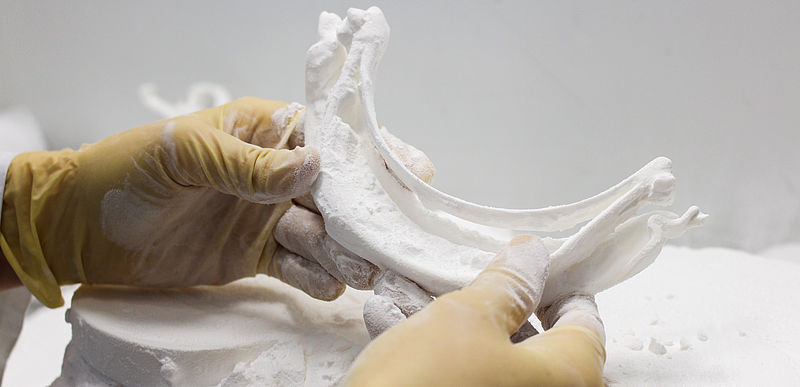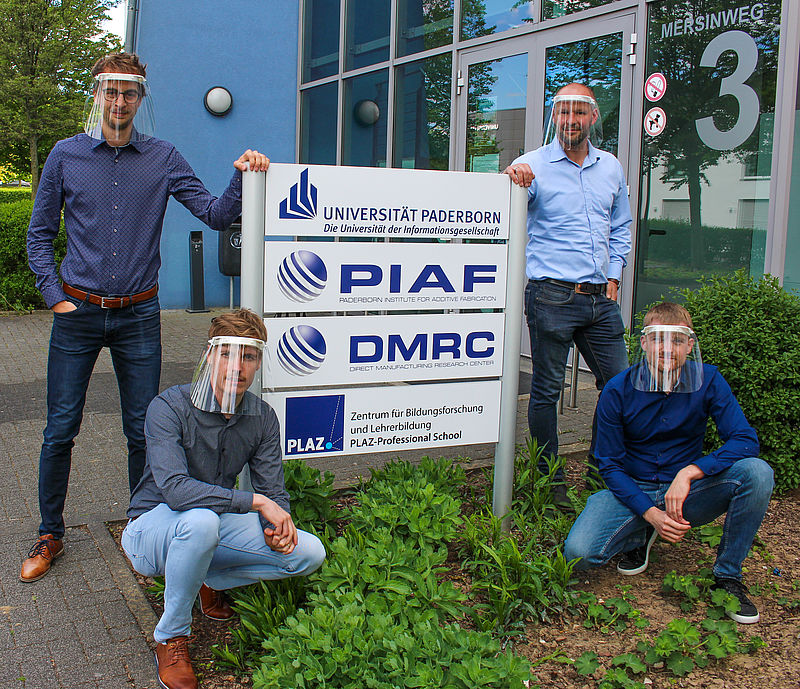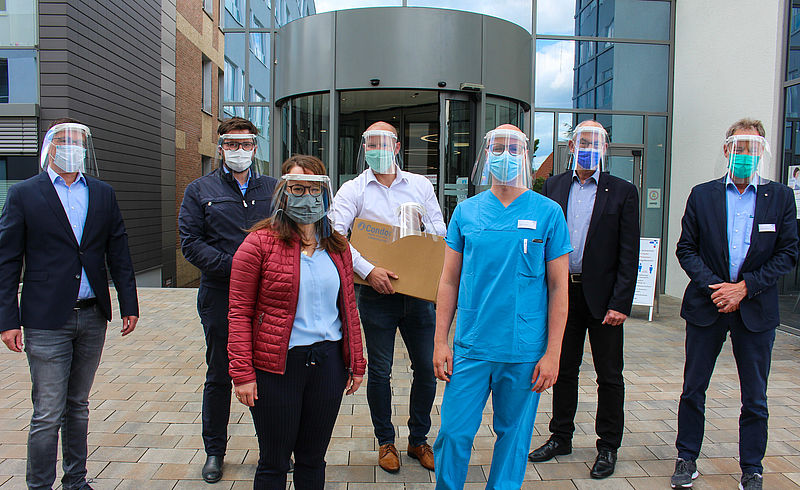Paderborn researchers and regional project partners produce 4,500 faceplates for health facilities in OWL
Since April 27th the mask obligation is valid in Germany. While self-made face coverings are also permitted for private use, masks in the health care sector, on the other hand, must meet higher requirements. To avoid bottlenecks, a regional project team has developed and produced face shields in the areas where they are most urgently needed. The team includes scientists from the University of Paderborn and the companies Condor MedTec GmbH, Centroplast Engineerings Plastics and LST-Laserschneidtechnik. A total of up to 4,500 units of the so-called "Faceshields" are to be delivered free of charge to hospitals, doctors' surgeries, nursing homes and other healthcare facilities in the OWL region. The Brüderkrankenhaus St. Josef in Paderborn has now received its delivery. Interested institutions can contact info(at)dmrc(dot)de to place an order.
Innovation driver 3D printing
Additive manufacturing processes, also known as additive manufacturing, are meeting with increasing interest in science and industry. At the University of Paderborn, there is a research institution called "Direct Manufacturing Research Center" (DMRC), which aims to industrialize exactly these processes. Together with Condor MedTec GmbH, physicians and nurses specialising in anaesthesia and intensive care medicine, four scientists from the DMRC have formed a core team to supply the region with industrially produced face shields using polymer laser sintering. The powder required for production was donated by EOS GmbH and Evonik Industries AG. Dr.-Ing. Christian-Friedrich Lindemann, Managing Director of the DMRC and coordinator of the four-member research group, is pleased with the results: "The current example shows that additive manufacturing can provide local substitutes for otherwise global supply chains at short notice. Due to the many advantages of the technology, AM has become an integral part of the industrial production landscape".
Faceshields meet high standards
In the early phase of the project, the participants first used video conferences to gain an overview of the current market, discuss ideas, prototypes and medical applications. In the end, the decision was made to produce face shields. An important criterion for the project team: the face shields, which are worn in addition to the mouth-nose protection in everyday clinical practice, must meet the medical and hygienic requirements of a hospital. Ira Fecke-Schulte, Managing Director at Condor MedTec: "On the one hand, the faceshields must be able to be disinfected well. On the other hand, they must have a standard size to be suitable for many head sizes. In addition, of course, they should also be comfortable to wear, safe and easy to remove. In this respect, it was also important for us that the wearers do not have to assemble the faceshields themselves, except for the headband". To ensure all this, they tested several prototypes and gathered feedback from users to further optimize the development process. DMRC developer Christian Schumacher, who created the design, played a major role in this process. "It was important to us to develop a professional and durable solution that meets the highest industrial standards," explains the designer.
Print templates for download
The plastic PET (polyethylene terephthalate) was used to manufacture the protective film, in which the companies Centroplast and Laserschneidtechnik were involved. The film is half a millimetre thick and measures 23 by 37 centimetres, which the developers recommend as the optimum size for use in hospitals. In addition to the delivery of face shields, the DMRC provides the design files for reproduction free of charge on the website www.dmrc.upb.de/content/downloads. Since the production equipment used is priced at the level of a single-family home, this offer is aimed primarily at industrial companies.
"From the region - for the region"
The project was made possible by the medical technology initiative "From the region - for the region". The DMRC and Condor MedTec GmbH had launched the initiative, which has since been joined by other partners. Together they want to make a contribution to society and to the protection of medical personnel.



